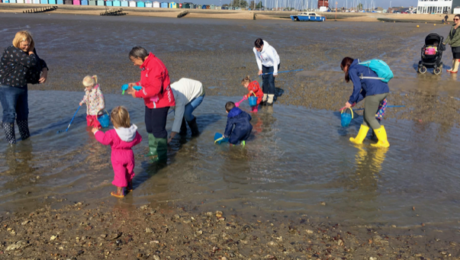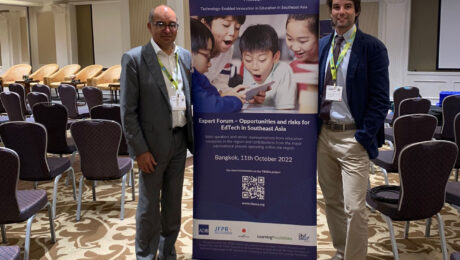A new world of learning
As our TIESEA project moves further into its exciting interventions phase it is timely to consider what happens next in learning?
We are at the start of the most exciting decade for learning ever, for a number of reasons. This new decade offers dramatic learning opportunities to communities and nations regardless of their staring points; a genuine levelling of opportunity. This short blog post begins the explanation of what those opportunities are, some of the reasons for them, and why it matters most for our TIESEA nations.
Firstly, the global impact of the pandemic on learning was profound. Around the locked-down world, children learned in new ways and in new places. The least successful of these were the attempts to carry on as before but with an analog of the classroom via Zoom or Teams. Same timetable, different locations.
“Good morning class. It’s 11:30 and time for our chemistry lesson. Cameras on, microphones off please”.
These analogs failed for many reasons, but principally there was an equity issue – many families simply could not all be live online at the same time; secondly these Zoomed lessons were hardly engaging and few children were stretched cognitively by sitting in front of screen watching their teacher.
However, the more successful lock-down lessons were asynchronous, had touch-points of plenary activity, and expected collaborative endeavour away from screens too. Better still, children found themselves in mixed age communities of learners, often including a parent or grandparent too; they exercised voice and vote over the direction of their learning. A research survey we posted (heppell.net/golden) revealed that in all of our research population of many thousands, not one child recorded pride in the BREADTH of curriculum covered, whilst almost all recorded with pride the DEPTH they had achieved in their chosen topic or topics. Deep learning and “learning elsewhere” triumphed.
Secondly, Learning has become über-fashionable in all our lives. Peak time TV shows around the world reveal celebrities learning to cook, or to sew, or dance… Some of the biggest audiences for YouTube videos are following the huge number of “How to” guides. TikTok has curated many truly exceptional learning moments each with their own dedicated audience (for example see tiktok.com/@tinyphysicslab). Learning has never been more cool.
And “learning elsewhere” quickly validated “learning outside”. This side of the pandemic, the move to explore outdoor learning is substantial and widespread. Children don’t want to be back in their boxes. In Madrid the tiny St Isabel International SEK School, with no outside play space, has created learning journeys throughout central Madrid (https://santaisabel.sek.es/en/the-school/learning-spaces/). Teachers have built these wonderful journeys around a curriculum focus and the destination of each walk is something of note within that urban community: pasta making, a jazz workshop, an embassy, a botanical garden – a great variety but importantly embedding the skills, resources and culture of the community in the formal learning of the school. On England’s East Coast Beachschool.org have the youngest children immersed in the data, flora and fauna of their beach’s marine science. The children are directly in tune with the seasons, the cycles and the exceptions on their coast. More importantly, their knowledge and interest have built a bridge into the old traditional community of oyster fishing and water conservation. Local experts suddenly have an engaged generation to pass their deep knowledge on to, and to learn from. It turns out that when you learn elsewhere, their is much of value, freely contributed, in our communities and families. There is no physical building at all. The beach is the centre of their learning, whatever the weather. That model is now being replicated on the banks of the Amazon in Colombia for the indigenous children of the rainforest.
In short, post pandemic, some learning has escaped. It’s escaped from the classrooms and timetables, it has escaped from the age phase structures and the “individual learner” focus of schools and it has escaped from much of the need for capital expenditure. With hybrid online learning, much stronger community collaborations and a greater outdoor focus it is clear that we can often do better learning for less capital expenditure and can see the results very quickly indeed. The implications for our TIESEA community are clear. And by pooling the important details to build economies of scale – for example in the curation of resources – we can gallop past richer economies struggling to maintain their expensive legacy systems.
It’s going to be a very exciting decade ahead.
TIESEA project member Professor Stephen Heppell.
Brightlingsea’s Beachschool children with their buckets and hand held digital microscopes
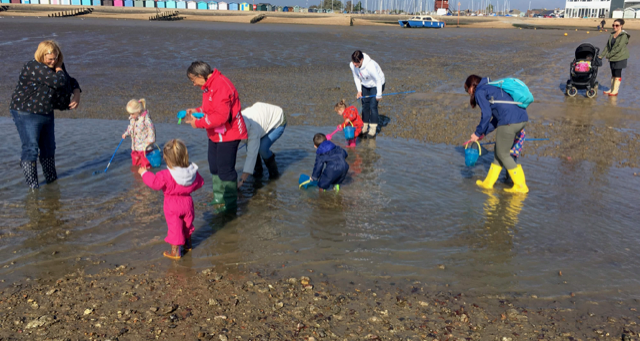
Brightlingsea’s Beachschool is all about the science – here exploring capillary tracking
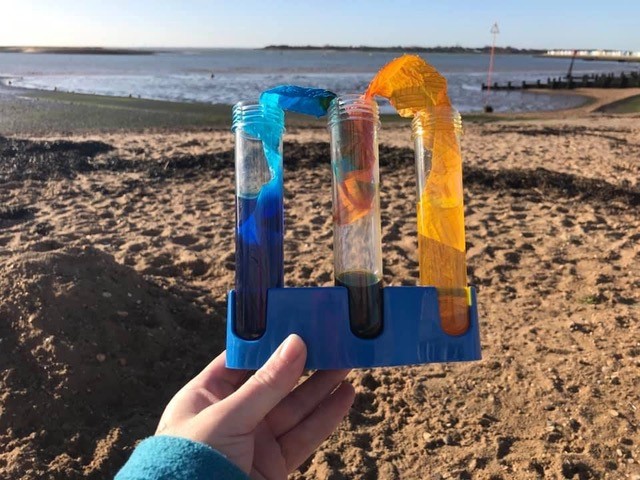
Mapping some of the learning journeys around the centre of Madrid – now very much a part of the St Isabel wide campus.
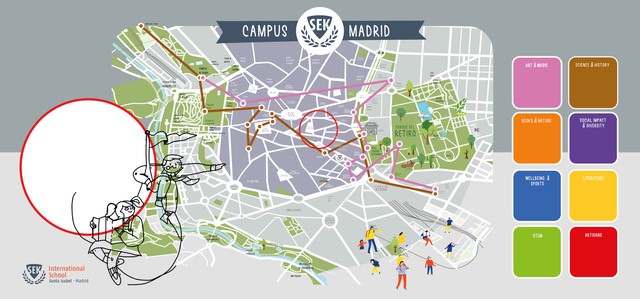
St Isabel children embarking on one of their regular learning journeys. Note the community figures watching over their safety!

TIESEA EdTech Interventions Proposal
Educational Technology (EdTech) has the power and capacity to significantly enhance teaching and learning for students in all parts of the world. Online, and digitally-enhanced, learning provides a new dimension that offers potentially unlimited opportunities; but, as we learnt during the COVID pandemic, these opportunities are unevenly spread. As a result of school closures, coupled with poor infrastructure, we know that many children in middle-income countries suffered almost two years without access to any form of tuition.
The Technology-Enabled Innovation in Education in South-East Asia (TIESEA) is a two-year multi-country program funded by the Japan Fund for Prosperous and Resilient Asia and the Pacific through the Asian Development Bank (ADB) and implemented by a joint venture between IBF International Consulting and Learning Possibilities. Aimed at piloting EdTech devices both in school and at home for students and teachers at secondary school level in order to assess the extent to which EdTech devices can be used to improve the learning and teaching quality among target students and teachers in the pilot school and community.
The TIESEA project, therefore, has an overriding ambition of proposing EdTech solutions in the four partner countries that are relevant, realistic, scalable, and sustainable; and which serve to bridge rather than deepen the digital divide. A common feature across all the country profiles is weak, unreliable, and uneven access to internet connectivity, especially in non-urban locations, and poor availability of EdTech devices for students.
Accordingly, in most interventions, at least part of the proposed solution is through providing rich and comprehensive learning resources through content-rich “internet in a box” with local distribution networks for universal access, where there is poor internet access. In most proposed cases the student devices are low-cost and durable tablets and cellphone handsets.
Through trialing the proposals in some of the most challenging environments, the hope of the project team is that there will good demonstrations of how technology-enhanced learning can be promoted and experienced by learners in all conditions. In this way, the TA team aims to show how scalability can be achieved through innovative technology applications and sustainable funding mechanisms that involve the private sector.
The country-level eReadiness assessments already conducted by the in-country experts of the TIESEA Technical Assistance (TA) team have identified the following national needs:
• In Cambodia, a need to use EdTech effectively to promote STEM and resource-based, student-centered education.
• In Indonesia, a need to find a mechanism through which schools in areas with limited Internet connectivity can join the rest of the country in adopting Kurikulum Merdeka (the recently launched, Freedom to Learn curriculum).
• In the Philippines, a need to find a mechanism through which vocational education can be extended to underserved areas of the country supporting youth in those areas to become skilled and work-ready.
• In Viet Nam, a need to equip students to be able to communicate effectively in English in an increasingly global society.
Read the full intervention here
How NOT to use EdTech in your classroom
As teachers, we all know that we are likely to find a range of abilities in any class group. In June this year (2022) the World Bank revealed that the level of ‘learning poverty’ in low- and middle-income countries (LMIC) has been exacerbated by the COVID-19 pandemic. An estimated 7 in 10 of all children in LMICs cannot read a simple text with comprehension by age 10. [1] These children are fated to fall further and further behind as they progress to higher grade levels where the ability to read becomes increasingly important. The issue of learning poverty is often compounded by textbooks exceeding the reading level of most students of the class. Indian education economist Karthik Muralidharan notes that in many struggling education systems, “textbooks are usually written by elites and only benefit the best students” (Mirchandani 2015). [2] Faced with such challenges, teachers often resort to teaching to the middle of the class, or even to the top of the class, guaranteeing that some of their students will be left behind.
How can education technology (EdTech) enable teachers to address such constraints to learning?
It is increasingly thought that the answer lies in differentiated learning. The UNESCO International Bureau of Education defines differentiated learning as ‘An approach to teaching that involves offering several different learning experiences and proactively addressing students’ varied needs to maximize learning opportunities for each student in the classroom.’[3]
In high-tech environments where students have access to individual devices, this can involve using tools such as Nearpod or Blendspace to curate lesson workflows for different students or student groups. Nearpod provides real-time insights into student understanding through interactive lessons andvideos, gamification, and activities. This allows teachers to create customized activities for self-paced individual work or group work at the ‘right level’. Blendspace allows teachers to draw together digital materials from a range of sources to create individualized learning spaces. To ensure that material is presented at an appropriate level, teachers can make use of resources such as Newsela which provides Science & Math, Social Studies, and Socio-Emotional Learning content at 5 reading levels. In specific subject areas, there is an increasing range of tools that use artificial intelligence (AI) to automatically select content based on student performance so that the student is always presented content at a level which is slightly challenging for them without being overwhelming. Examples include i-Ready personalised learning in Reading and Mathematics for grades K-8 and the Khan Academy tools for learning Science and Math concepts.
The key to differentiated learning is using formative assessment to adjust the learning experience for the student. While AI enables an increasing range of personalised learning software to do this automatically, teachers can also draw on digital formative assessment tools to give them quick assessments of student’s understanding enabling them – to manually adjust their teaching. Options include Socrative, Poll Anywhere, Mentimeter, or Kahoot. All of these tools provide quick assessments of student understanding in a fun, anonymous and hence stress-less manner. EdPuzzle allows teachers to integrate quizzes into videos. ASSISTments allows Math teachers to assign problem sets; students doing the exercise get automatic feedback while the teacher receives reports on their performance.
There is increasing evidence for the value of formative assessment, or “assessment for learning” (Wiliam 2013). This assessment is not primarily about collecting data on students’ performance but as , Benjamin Bloom observed half a century ago, “We see much more effective use of formative evaluation if it is separated from the grading process and used primarily as an aid to teaching” (Bloom 1969, p. 48). Formative assessment takes place during learning, not after. [4]
Why then do we so often see teachers neglecting formative assessment options, ignoring the needs of individual learners in their class, and using EdTech to support teacher-centered pedagogies? Content-heavy PowerPoint presentations or even textbook exercises are projected onto a screen or SmartTV forcing all students to move through the lesson at the same pace (or to switch off). Digitized games which could be highly motivational if used on individual devices are likewise projected to the whole class discouraging all but a small percentage from participating. Is this helping the teacher? Most definitely. It reduces preparation time, particularly if the digital materials are provided by a textbook publisher as is common in some countries, and if materials can be reused the following year. Focusing student attention to the front of the room also helps maintain teacher control of the class. Is it helping the students? Generally, not. These scenarios only represent the digitization of traditional teacher-centered pedagogies and cater to a small portion of the class while less able students fall further and further behind.
The Technology-Enabled Innovation in South-East Asia (TIESEA) project recognises the importance of learner-centered pedagogies and strives to use EdTech to promote and support such approaches. In Viet Nam, the project will pilot the use of the Elsa Speak app which uses AI to help students of English improve their pronunciation skills. Students will be provided with smartphones which they can use to practice at home. This recognises research that found higher achievement levels in interventions that effectively extended the school day. [5] Teachers will receive training in how to facilitate communicative English as mandated by the government of Viet Nam in their latest curriculum revision. In Cambodia and Indonesia, STEM students who live in small communities close to their school will be able to work on real world projects together using Internet resources accessed through a mesh network (Cambodia) or from an offline content server (Indonesia and Cambodia). Once again, teachers will be supported with training in learner-centered teaching approaches. In Indonesia, this will be done with the assistance of Guru Penggerak – teachers in model schools trained to implement the Ministry of Education and Culture’s progressive Kurikulum Merdeka and, in Cambodia, by the Kampuchea Action to Promote Education (KAPE) NGO.
The implementation plan for the TIESEA pilot can be found here.
[1] https://www.worldbank.org/en/news/press-release/2022/06/23/70-of-10-year-olds-now-in-learning-poverty-unable-to-read-and-understand-a-simple-text#:~:text=An%20estimated%207%20in%2010,This%20is%20unacceptable.
[2] Smart, A & Jagannathan, S (2018): Textbook Policies in Asia – Development, Publishing, Printing, Distribution and Future Implications, Asian Development Bank
[3] The UNESCO International Bureau of Education defines Differentiated Learning as An approach to teaching that involves offering several different learning experiences and proactively addressing students’ varied needs to maximize learning opportunities for each student in the classroom.
[4] Smart, A & Jagannathan, S (2018): Textbook Policies in Asia – Development, Publishing, Printing, Distribution and Future Implications, Asian Development Bank
[5] Ma, Y., Fairlie, R.W., Loyalka, P., & Rozelle, S. (2020), Isolating the “TECH” from EdTech: Experimental evidence on computer assisted learning in China, National Bureau of Economic Research, Working Paper 26953, Cambridge, MA
Opportunities and risks for EdTech in Southeast Asia – (Vietnamese)
Catch up or re-watch the ‘Opportunities and risks for EdTech in Southeast Asia’ event from Bett Asia, with leading industry experts and senior government leaders.
This recorded session outlines the local situation, country by country, and seeks to demonstrate how the project interventions can overcome obstacles in order to maximise the contribution that EdTech can make to both students’ achievement and the quality of learning in the region.
- Published in Vietnam Workshops, Workshops
Opportunities and risks for EdTech in Southeast Asia – (English)
Catch up or re-watch the ‘Opportunities and risks for EdTech in Southeast Asia’ event from Bett Asia, with leading industry experts and senior government leaders.
This recorded session outlines the local situation, country by country, and seeks to demonstrate how the project interventions can overcome obstacles in order to maximise the contribution that EdTech can make to both students’ achievement and the quality of learning in the region.
- Published in Workshops
Opportunities and risks for EdTech in Southeast Asia – (Khmer)
Catch up or re-watch the ‘Opportunities and risks for EdTech in Southeast Asia’ event from Bett Asia, with leading industry experts and senior government leaders.
This recorded session outlines the local situation, country by country, and seeks to demonstrate how the project interventions can overcome obstacles in order to maximise the contribution that EdTech can make to both students’ achievement and the quality of learning in the region.
- Published in Cambodia Workshops, Workshops
Opportunities and risks for EdTech in Southeast Asia – (Indonesian)
Catch up or re-watch the ‘Opportunities and risks for EdTech in Southeast Asia’ event from Bett Asia, with leading industry experts and senior government leaders.
This recorded session outlines the local situation, country by country, and seeks to demonstrate how the project interventions can overcome obstacles in order to maximise the contribution that EdTech can make to both students’ achievement and the quality of learning in the region.
- Published in Indonesia Workshops, Workshops
Bett Asia – Meet the speakers
Meet the leading industry experts and senior government leaders who spoke at our expert forum ‘Opportunities and risks for EdTech in Souteast Asia’ at Bett Asia.
Participants sponsored by the TIESEA project
Rithy Thull
Mr. Pring Morkoath
Mr. Eang Pisey
Teti Kurniawati
Ms Jacqueline Jamillah ALi
Ms Redilyn Agub
Dr. Luu Bich Ngoc
Dr. Tô Hồng Nam
Dr. Ton Quang Cuong
TIESEA Team
Dr. Tim Denny
Ms Zenaida Domingo
Ms Cahya Kusuma Ratih
Mr Kosal Chea
Ms Nguyen Hong Hanh
ADB
Dr. Ayako Inagaki
Mr. Fook Yen Chong
Other (including Speakers)
Mr. Michael Ngo
Mr. Vincent Quah
David Hollands
Andi Kristanto
Vatsun Thirapatarapong
Rithy Thul
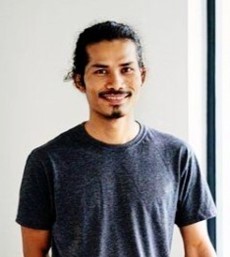
Passionate about promoting bicycle, technology and start-up from Cambodia.
I am a co-founder of SmallWorld Venture, a micro-vc and venture builder based in Phnom Penh in 2011, Codingat.com, a Cambodia based tech venture in 2013. I have practiced micro-investing in over 20 startups since founding SmallWorld, one of which happened to be BookMeBus.com.
In 2017, co-founded an open source-based computer company, KOOMPI, with a mission to create tools for the next generation of social and business innovators, scientists, engineers, and explorers. That same year, I also started a sustainable living village concept and a reforestation pilot project called VitaminAir located around 110 km from Phnom Penh. It is still in its early stage of development.
In 2019, established Selendra Blockchain, a multichain interoperable Nominated Proof-of-Stake network for developing and running EVM compatible blockchain applications. Selendra aims to nurture a network of DApps that will be at the forefront of Web 3.0 adoption in Cambodia and the region.
In short, bring blockchain’s many benefits, a step closer to the masses – the ordinary person. And help accelerate the advancement and strengthen the industry as a whole.
Mr. Eang Pisey
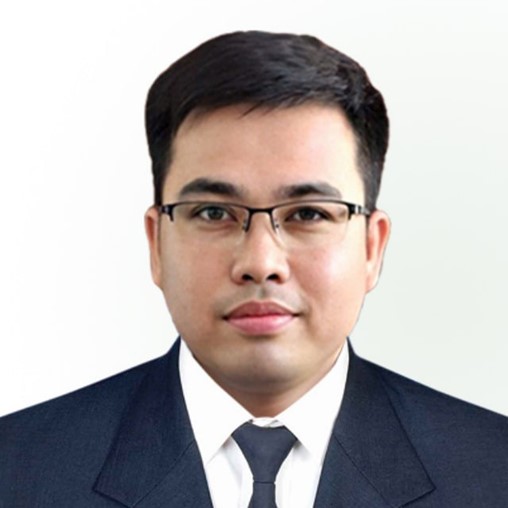
“My name is Eang Pisey and I am a Science Education Team Leader for the New Generation School Program, a reform in Cambodian Education, for over 6 years with 10 special selected schools. Below are my key responsibilities for my current career:
- Train all the teachers in the program about STEM, methods of teaching, ICT in teaching etc.
- Facilitate all the Science Education to all targeted schools of NGS
- Design of Science Curricular materials to promote intensive science education at a Science Theme School.
- Conduct teacher orientation in the use of the Science Lab and its equipment as well as safety hazards.
- Carry out workshops with teachers on a regular basis with specific topics relating to the science curricula.
- Lab installation in NGS Scholls, this entails the procurement and organization of materials to equip the labs, and overall monitoring.
- Provide support to Science teachers inside and outside the classroom.
- Observe Science classes and provide constructive feedback to teachers.
- Create a resource list that cross-references available educational online resources in Khmer and English that apply to relevant lessons in the curriculum.
- Track those teachers who are making the best progress in their teaching and those that are making the least progress.
- Technical support to Science Clubs and STEM Education.
In my free time, I like doing research on the web and reading books.”
Bionote – Redilyn C. Agub
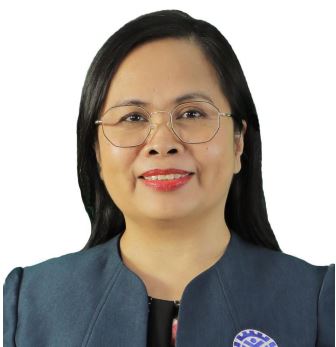
Redilyn C. Agub, the Chief of the eTESDA Division of the Technical Education and Skills Development Authority, started her career as a Science and Math teacher. Her love of computers and its related technology allowed her to bloom into a TVET leader that continually influences TVET educators in the
Philippines.
Ms. Agub is the first trainer to be certified by TESDA for the Competency “Developing Learning Materials for eLearning” a course under Trainers Methodology Level II for Philippine TVET. She currently leads the development of courses and management of the TESDA Online Program, the TVET platform that offers
FREE technical vocational courses in the Philippines.
She authored two (2) modules and led the training of lead trainers on Trainer’s Methodology Level 1, a course required of all TVET trainers in the Philippines. She is also a certified trainer of the module Develop Learning Materials for e-Learning, a module of Trainers Methodology Level 2.
In her previous assignment as the supervisor of the Curriculum and Training Aids Development Division (CTADD) of TESDA, she led her team in policy making activities on Curriculum and Learning Systems. Among the projects she was involved in are the research in Philippine Credit Transfer System (PCTS) and the Evaluation of the Diploma Level Curriculum which lead to the “Manual for the Evaluation of PQF Level 5 (Diploma) Programs” which she wrote for TESDA.
Dr. Ton Quang Cuong
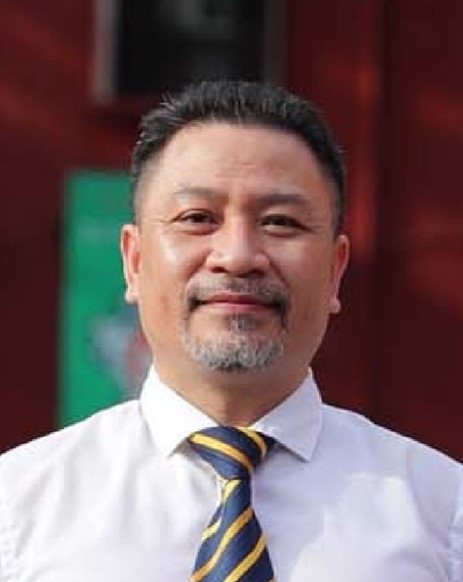
Dr. Ton Quang Cuong is Dean of Edtech Faculty, University of Education, Vietnam National University, Hanoi (VNU-UEd). He is known as an Edtech thought leader and MOET’s Consulting Specialist on Edtech for K-12 education in Vietnam.
Ton Quang Cuong is a superior lecturer with extensive teaching experience on teacher education, educational technology and management skills and worked 16 years for a Faculty of Teacher Education, University of Education. The university provides new model of teacher training in Vietnam, develops research and service in educational management and leadership, collaboration with other institutions in Vietnam and oversea.
As a honor and prestige expert, Head of Department of Learning Theories and Instruction Technology and Dean of the Faculty, he is responsible for the development curricula, learning methodology and technology, leadership and management instruction at Faculty of Teacher Education, VNU-UEd.
Since February 2018 he leads the first one in Vietnam Faculty of Educational Technology which provides new educator generation – “EduTecher” and pursues new trends of educational technology, technology and society.
Dr. Luu Bich Ngoc
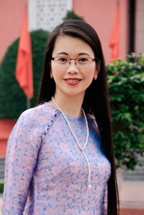
Assoc. Prof. PhD
Director
National Council Office for Education and Human Resources Development
VIETNAM MINISTRY OF EDUCATION AND TRAINING
35, Dai Co Viet Road, Hai Ba Trung District, Hanoi
Tel: 0912 378 681; Email: lbngoc@moet.gov.vn
http://hoidongquocgiagiaoduc.moet.gov.vn
Ms. Jacqueline Jamillah J. Ali
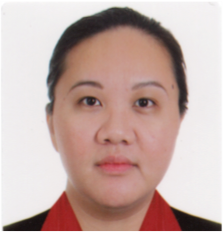
Position: Supervising Technical Education and Skills Development (TESD) Specialist Organization: National Institute for Technical Education and Skills Development (NITESD), eTESDA Division
Jacqueline Ali is the Supervising Technical Education and Skills Development Specialist of the eTESDA Division under the National Institute for Technical Education and Skills Development (NITESD). She supervises the in-house development of online technical vocational education and training (TVET) courseware and the management of the TESDA Online Program (TOP), TESDA’s platform for massive open online courses (MOOCs) for TVET.
With focus on research and development and partnerships and linkages, Jacqueline develops program and policy recommendations for TVET implementation and fosters collaborations and networking for the sector. Working in the development sector, she leverages her Art Studies background in developing people-centered interventions for social equity, diversity, and sustainability towards the creation of a community of practice for TVET.
Email address: jjali@tesda.gov.ph
Ms. Teti Kurniawati
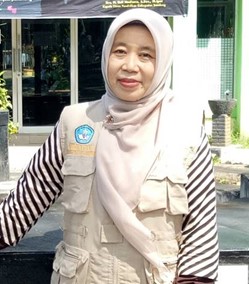
Ms. Teti Kurniawati was born in Bandung 14 January 1977. She is a science teacher at SMPN 3 Baleendah, Bandung Regency, West Java, in Indonesia. This school has about 1.200 students spread over 33 classes, and I teach 5 classes in 9th grade. My last education was S-2 (master) science education at UPI (Indonesian Education University). Ms Kurniawati has a strong ambition for science because it is very human life -related, contextual, and can be used to solve life problems. Therefore, she uses the learning model called the STEM-PjBL learning model. This model can stimulate or motivate students to understand natural phenomena, recognize problems in their environment, and be able to solve these problems by creating and producing a product that is useful in life.
Mr. Pring Morkoath
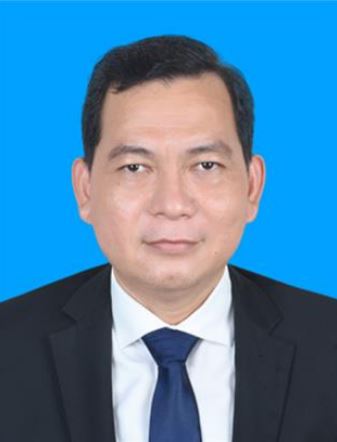
Director of General Secondary Education Department,
Ministry of Education, Youth and Sport,
Kingdom of Cambodia,
Mr. Morkoath is serving as Director of GSED from 2017 onwards. For the current time, I am a deputy project manager for USESDPII /ADB and coordinator for SEIP/WB Project and have been instrumental in Covivd 19 response supporting teaching aids production, multidisciplinary teaching method and distance learning.
Mr. Morkoath receive Bachelor of Science in Biology from RUPP in 1996, Secondary Teaching Pedagogy Certificate from NIE in 1997, Master in Law and Political Science from BBU in 2011 and Educational Management from NIE in 2016.
Dr. Tô Hồng Nam
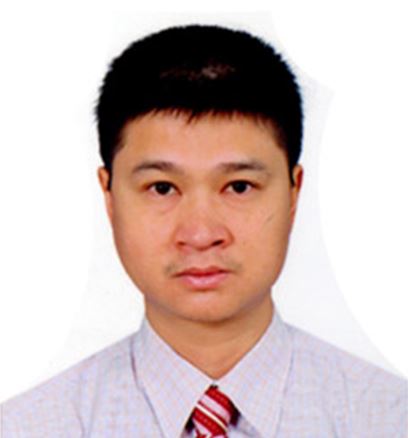
Dr. Tô Hồng Nam acts as the Deputy Director of the Department of Information Technology of the Ministry of Education and Training (MOET). He is a doctor of Public Administration from the Vietnam National Academy of Public Administration and possess a Master of Public Policy, University of Queensland, Australia.
Nguyen Hong Hanh
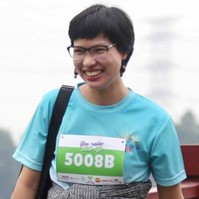
Ms. Hanh has over 10 years’ experience working with over 200 leading publishers, content providers and Edtech companies. She holds MA in international relations (Diplomatic Academy of Viet Nam) and she is currently the Founder and CEO of Edtech Agency (Viet Nam).
She has been the Director of the Learning tree project, a non-profit educational project aiming at creating a MOOCS, where she developed MOOC translators communities across countries and establish business partnership with MOOCs providers worldwide. Between 2012 and 2019 she worked at Alpha Books JSC, where she has been in charge of K12 Texbook Project and E-learning Project.
Ms Cahya Kusuma Ratih (Cahya/Ratih)
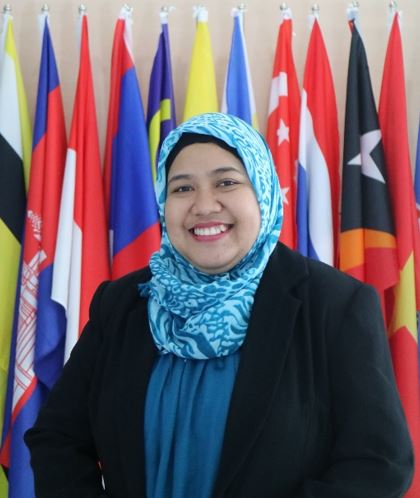
Dipl.Ing (BA), S.ST, MT
cahya@seamolec.org
+62 81 398 426 293
She graduated more than 10 years ago in computer sciences, but currently is pursuing her passion in ICT for education. She is working with SEAMOLEC since 2008. She started her career as a junior instructor at Vocational Education Development Center in Malang and then worked on various regional and international projects with SEAMOLEC.
Her recent contribution to several projects including (1) South-East Asia Sales Competition funded by the Erasmus+, European Union, (2) Technology-enabled Innovation in Southeast Asia Education (TIESEA) funded by the ADB, (3) International Telecommunication Union – Indonesia Schools Connectivity Assessments funded by the FCDO, UK (4) Development of Digital Human Resources through Online Education for the Development of Digital Economy –national priority research funded by the MoECRT in 2021.
Because of her active contribution to the dissemination of Common ASEAN Tourism Curriculum (CATC) Toolboxes empowered by distance learning, since 2019, she is a member of the Indonesia National Tourism Professional Board (NTPB) based on SK Kemenpar No KM288/IL.15/MENPAR/2019 and KM/111/IL.09.00/2021.
Mr John Denny, PhD
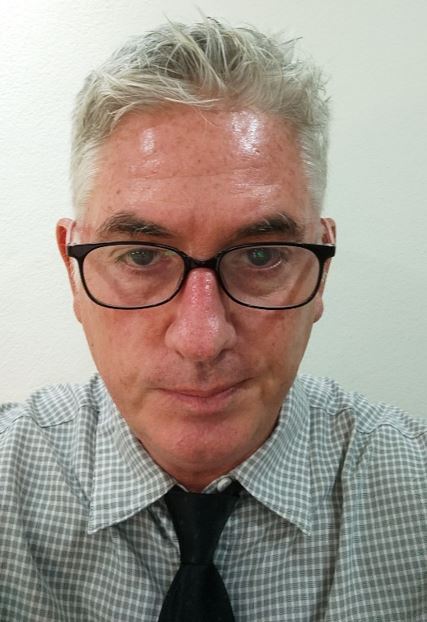
Education consultant
Email: johndenny@alumni.usc.edu
Mr. John Denny (Tim) is a senior technical advisor on a wide range of education issues supporting mainly developing countries throughout Asia and Africa. He is currently supporting the Asian Development Bank and the EU on research toward country situation analysis on education technologies.
Tim started his career in the field of education in the late 80’s in higher education management, then went on to a successful teaching career where he served as professor in universities in Japan, Taipei, Vietnam, and the USA. In 2005 he changed focus to become an advisor to governments on education issues and since that time has supported development of secondary and higher education policy/plans, ICT for education guidelines, and national education sector analysis. He has served as a UNICEF staff for 6 years where he has lead education research, developed education management information systems and deployed national emergency education solutions through manmade and natural calamities. He has held a passion for education technologies throughout his career and is currently focusing on assisting private sector upstarts, NGOs and through consultancy work to revision education systems in preparation for the “forth industrial revolution” which will see focus on outcomes rather than inputs.
Brief presentation summary:
Teacher development in a digital age: ideas to bridge the rural-urban divide
Will focus on transformative ideas to effectuate lasting change in how rural teacher development and retention is approached in order to introduce sustainability and bridge the major challenges faced in rural teacher retention. While in this digital age there are many great solutions that utilize ICT in an effort to address weaknesses, the author argues that jumping to a solution without clearly understanding the problem and developing cultural change will be short lived.
Mr Kosal Chea
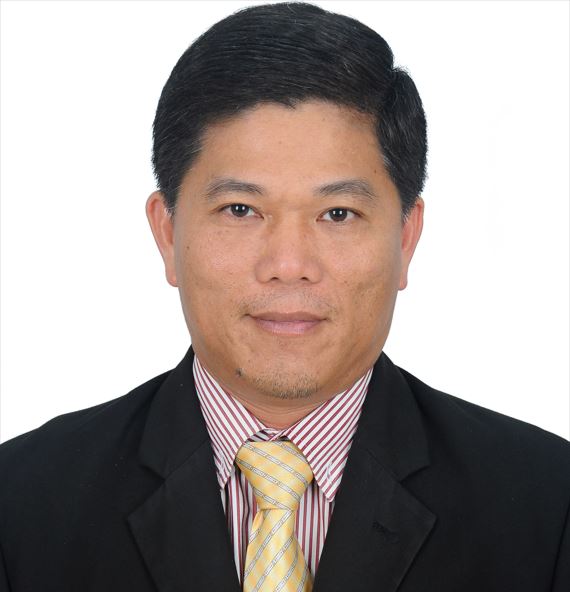
An education development specialist, program planner, researcher, advocacy; awareness raising and policy development with more than 20 years’ experience in the field of formal and non-formal education, early childhood care development, child labor education, child dropout prevention through innovative ICT technology programming in Cambodia. He has extensive experience in implementing international donor projects in collaboration with government partners, subcontractors and local community stakeholder groups. His experience includes managing and implementing programs from the initial research phase and situational analysis, through to baseline assessments, program start up, monitoring and evaluation through the implementation phase and conducting final assessments.
Holding various position in his career ranging from trainer, project assistant, senior project assistant, education advisor, education specialist and top management position such as project director, country coordinator, country director managing multimillions USD dollar project funded by major donors such as UNICEF, Plan International, Winrock International, USAID, USDOL and more. He has Master’s degree in Business Administration, gained from Australia and a Bachelor in education and fluent in both Khmer (native language) and English Language. Currently working as Independent Consultant.
Zenaida T. Domingo
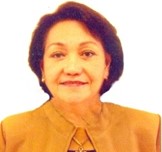
Zenaida T. Domingo is the National Focal Person of TIESEA Philippines. She has more than 30 years of extensive experience in planning, management, training, media production and monitoring/evaluation of education projects in the formal sector, alternative learning system and early childhood care and development. Her major work focus includes distance education, media-based instructional strategies, curriculum development and course design of audio-video learning modules. Her other areas of specialization are: advocacy and social mobilization, media production, partnership building with both local and international agencies, government institutions, non-government organizations, community-based groups, and the private sector
She has served the education sector in various capacities: Commuication Specialist of the Early Childhood and Development Council; Director of the SouthEast Asia Centre for Lifelong Learning for Sustainable Development (SEA CLLSD), a Category 2 Centre of UNESCO; Philippine Project Director of the Education ahd Livelihood Skills Alliance (ELSA), of the International Youth Foundation which was an implementing partner of the USAID EQuALLS 2; Project; Director, Business Development Office/Senior Training Specialist of SEAMEO-INNOTECH where she managed projects for USAID, UNESCO, World Bank and the Philippine Senate; Manager, Media Communications and Training Programs of the Technology and Livelihood Resource Center and managed print/radio-TV production, training, distance study, techno-info dissemination services; supervising producer of 2 TV programs on agribusiness and technology-based livelihood enterprises; Director of a World Bank distance education project. She has also served as consultant to various educational development a agencies including World Bank, ADB, UNESCO, ILO, Aus-Aid. With a masteral degree in educational communication and a Ph.D. in educational management, she was a recipient of scholarships and professional grants from UNESCO, East-West Center, University of Pennsylvania. Nippon Hoso Kyokai, Hoso Bunka Foundation, and Friedrich-Ebert-Stiftung.
Ms. Ayako Inagaki
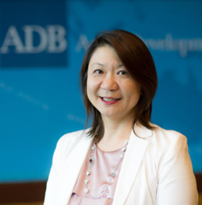
Director
Human and Social Development Division
Southeast Asia Department
Asian Development Bank
Ayako Inagaki is the Director of the Southeast Asia Department, Human and Social Development Division at the Asian Development Bank (ADB). She leads the planning, implementation, and supervision of ADB’s lending and non-lending operations in education, health, and social protection. As Chair of ADB’s Health Sector Group, Ayako also oversees the preparation and implementation of the health sector group work plan. Ayako has over 30 years of experience in the sectors and has recently worked on emerging and cross-cutting issues affecting human and social development, such as digitalization, post-pandemic recovery, and climate adaptation and resilience.
Fook Yen, Chong
Fook Yen, Chong is a senior social sector specialist (skill development) working in the Asian Development Bank. He has more than 25 years of work experience in Technical Vocational Education Training (TVET). In ADB, he manages and supports TVET/Higher Education projects in India, Bangladesh, the Philippines, Cambodia, and Indonesia.
Prior to joining ADB, he worked in various multilateral and bi-lateral organizations such as GIZ (German Corporation for International Cooperation), the World Bank Group, Institute of Technical Education-Singapore, and Rwanda Workforce Development Authority. He contributed extensively to improving TVET in different part of the world in countries such as Mozambique, Uganda, Rwanda, Mongolia, Pakistan, Malawi, Tanzania, Bangladesh, India, Nepal, China, and India.
As a practitioner in TVET, his expertise includes TVET strategic planning, training facility infrastructure planning and design, TVET curriculum design and development, TVET training equipment requirement, and TVET teachers’ training. He has co-authored two publications on Training Facility Norms and Standard Training Equipment Lists for Precision Engineering and Mechatronic Technology trades. His latest pursue is in developing and deploying Mixed Reality (MR) training content for skill training, and accelerating TVET institutions capability in developing fourth industrial revolution expertise. He also has a strong interest in exploring how investing in innovations and technologies can drive economic growth in developing countries.
David Hollands
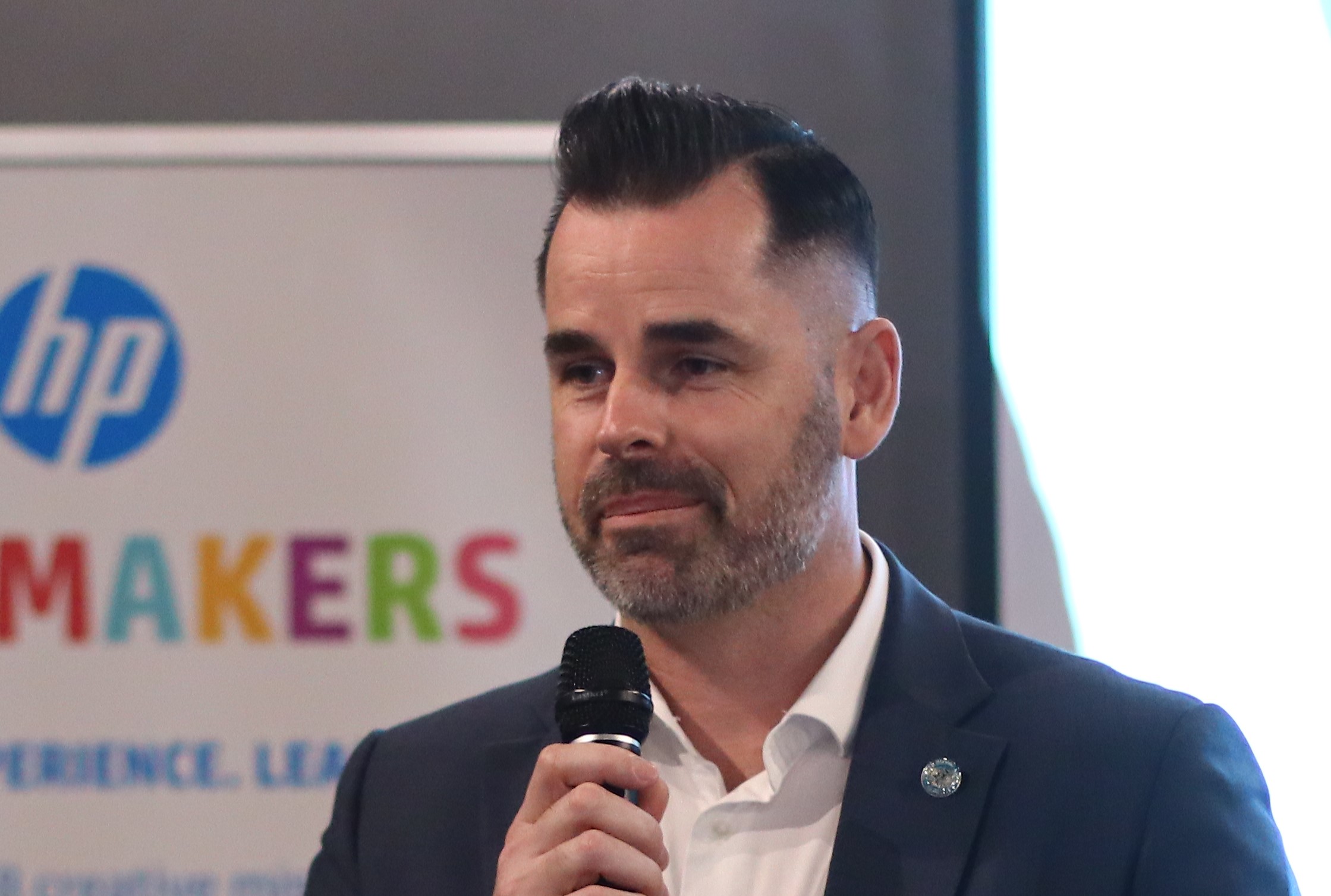
Global Education Strategist
HP
Australia
+61437901338
david.hollands@hp.com
https://www.linkedin.com/in/davidhollands1/
David is passionate believer that education is the building block for transforming people, communities, and our planet for the better. Focused on the role education has to build foundations of lasting social and economic change, David uses his background and decades of experience in technology ,megatrends , innovation and strategy to help engage transformation for education.
David is a Global Education Strategist, driving HP’s education strategy and solution development. Engaging with Governments , NGO’s , UN entities, institutions , educators and students to help realise the goal of improving education outcomes for 100 million learners by 2025.
Outside of his role at HP , David volunteers his own time in a range of global education engagements, most recently as a judge for the world’s best school prize , as well as mentoring organisations, individuals and acting as an industry advisor for Australian Digital Technologies curriculum.
Michael Ngo
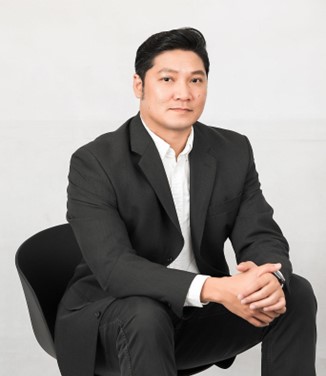
Country Manager of ELSA Speak Vietnam / Giám đốc Quốc gia tại ELSA Speak Vietnam
Michael is currently Country Manager of ELSA Speak Vietnam, a leading AI solution for English pronunciation with over 10 million downloads in Vietnam and 40 million worldwide. Before joining ELSA Speak as Country Manager, Michael Ngo had more than 15 years of experience in technology and digital industries in Asia.
With an ever-growing passion for innovation, Michael Ngo has engaged in creating business solutions for EdTech, O2O, Mobile, eCommerce, Marketplace, Logistics, B2B SaaS and Digital Transformation.
- Country Manager at ELSA Speak Vietnam
- MBA from University of California, Los Angeles (UCLA) & National University of Singapore (NUS)
- Co-founder/ COO at Okiela | E-commerce technology company
- Business Director at Grey Group | Dentsu | Havas Worldwide
Vincent Quah
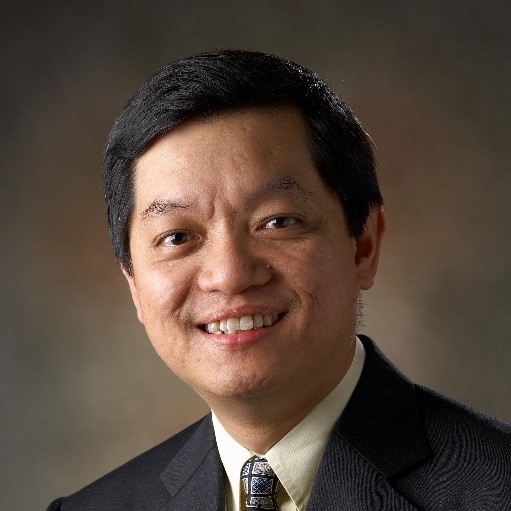
Vincent has more than 30 years of work experiences in the Government, Education, Life Science and Research sectors. He has worked in both the public and private sectors and has had roles ranging from sales, business development, operations, education, research and teaching. Currently, he is Director, Education Industry for Microsoft APAC and he has responsibilities that include strategy development, business development/growth and working to support education customer success in their adoption of Microsoft technologies and platforms. Vincent spends most of his time with senior officials in the Ministry of Education and tertiary education institutions, listening and speaking with stakeholders to understand their needs and requirements.
Prior to his current role, Vincent has also spent the bulk of the last 7 years working with customers to accelerate the adoption of cloud technologies to address their digital transformation agendas, be operationally more efficient and effective, and to deliver a higher value to their users. In addition, Vincent has spoken and participated in conferences in more than 15 countries, including Australia, Canada, China, India and Singapore. Vincent was also appointed to the Asia Development Bank’s High Level Advisory Group for Digital Technology from 2019 – 2022.
Andi Kristanto
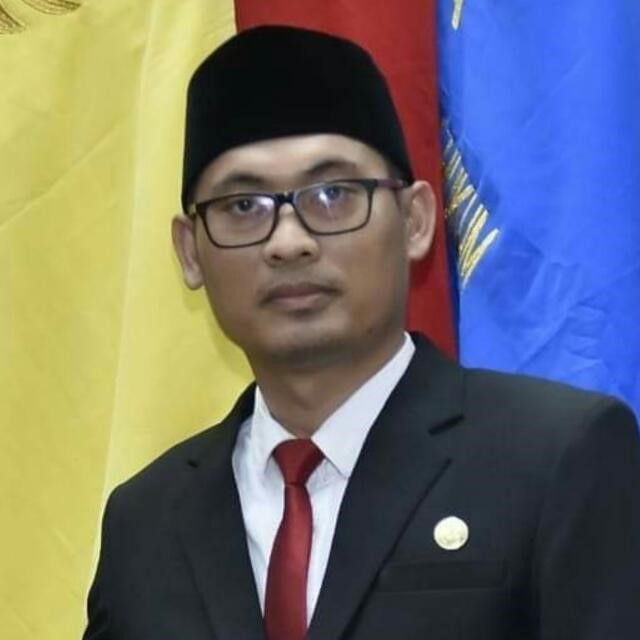
My name is Dr. Andi Kristanto, S.Pd., M.Pd. I come from Surabaya Indonesia, Organizational position as vice secretary Indonesian education technology study program association.
Structural Position at State University of Surabaya (Universitas Negeri Surabaya) as Head of Educational Technology study program Faculty of Education, Address Kampus Unesa lidah wetan Surabaya, Indonesia. Functional Assoc. Proffesor. Email: andikristanto@unesa.ac.id, phone number: 082243442755. I teach in undergraduate, masters and doctoral programs of educational technology study program. From 2017 to 2022: I have 17 research, 10 community service, 21 publications in reputable journals, 7 books/moduls, 50 intellectual property rights, H-index scopus 3, and Enter the 5000 Top Scientist Indonesia in 2022.
Vatsun Thirapatarapon
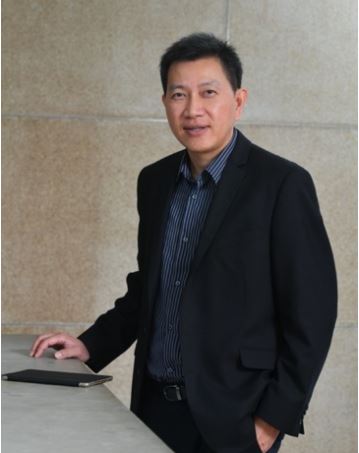
Country Manager
AWS (Thailand)
Vatsun Thirapatarapong is the Country Manager at AWS (Thailand) and brings more than 25 years of experience in the digital and ICT industries across sales management, channel & operations, business & strategy planning, as well as business development.
His prior experience was in engineering and consulting positions at Schlumberger Overseas S.A., Esso Standard Thailand, and IBM Thailand; and
country management positions at Hewlett-Packard (Thailand) and Cisco Systems (Thailand and Indochina). He also had participated in the NBTC sub-committee to shape the initial VoIP (Voice over Internet Protocol) landscape for the country, as well as actively involved in the consulting roles for various public and private digital transformation projects in Public Sector, Telecom, financial and service industries. He is now leading the teams at AWS Thailand as Country Manager, which he sets the strategic direction for the company in the development of cloud business in the country. Currently, he also serves as the Advisor to National Commission for Digital Economy and Society, chaired by Deputy Prime Minister.
Vatsun has a Bachelor’s degree in Electrical Engineering, MBA in Marketing and MIS, and Certificate of Digital Transformation from MIT Sloan Management.
- Published in All Reports, Uncategorized
